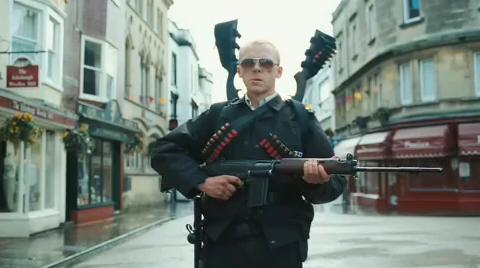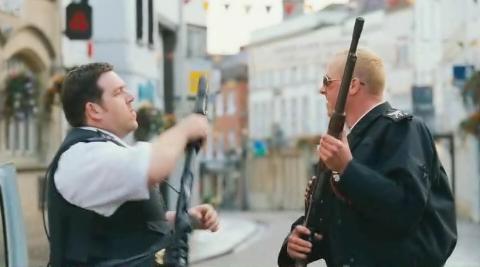Hot Fuzz (Edgar Wright, 2007)
The team of actor / writer Simon Pegg and director / writer Edgar Wright immediately established a huge cult following with their first film, the zombie / romantic comedy hybrid Shaun of the Dead. Their core audience of fans will need no encouragement to see their new film, the cop movie spoof Hot Fuzz. Yet Hot Fuzz looks likely to both consolidate and broaden their audience; while it is not quite as bold as its predecessor, it is nonetheless hugely enjoyable and is sure to expand their following.
The film is more accessible than its predecessor largely because it takes its cues from sources (cop films) that are more widely known and less confronting than the zombie films that inspired Shaun of the Dead. Pegg plays Nicholas Angel, an impossibly skilled police officer in London who is transferred to a small village after his colleagues tire of his super-effectiveness. There is mutual distrust between him and many of his new colleagues, although he does forge a friendship with the amiable junior officer Danny (Nick Frost, Pegg’s costar from Shaun of the Dead), who is in awe of his big city knowledge. Angel seems a poor fit for the rustic village until he finds himself investigating a series of bizarre deaths, and must try to convince his sceptical colleagues that they are in midst of a killing spree. While the film’s most obvious influence is Hollywood cop movies, the plot also shows a more British influence: the still-flourishing genre of Agathie Christie-inspired whodunits set in suspiciously crime-ridden English villages (seen particularly on British television, but also with American cousins such as Murder She Wrote). One of the film’s best comic devices is the incongruity of mixing the high-octane cinematic techniques of the American cop genre with the twee iconography of these British village crime mysteries.
The genre’s need for a large cast of suspects, as well as the success of Shaun of the Dead, has afforded Wright and Pegg the opportunity to build an even larger pool of on-screen talent than in the earlier film. The cast includes much of the British comedy A-list (Steve Coogan, Bill Bailey, Martin Freeman, Stephen Merchant), as well as veteran character actors (Jim Broadbent, Bill Nighy) and performers known for their iconic genre roles (Timothy Dalton, Edward Woodward, and Paul Freeman). Interestingly, apart from the leads, it is the character actors who get the most screen time: most of the comedy performers get small walk-ons, while the experienced veterans get much meatier roles. Dalton is particularly fun to watch as a local shopkeeper whose every appearance so obviously screams “villain” that you wonder whether he’s a deliberate red-herring, or a double-bluff. The ever-reliable Broadbent, as the jovial head of the local police force, is also predictably good.
The reliance on solid actors speaks of the intelligence with which the whole thing is put together. What is so appealing about the approach of Pegg and Wright – both here and in Shaun of the Dead – is that they don’t use comedy as an excuse to be lazy. Hot Fuzz isn’t a Police Squad / Naked Gun style riff on the idiocies of the genre, or a Lethal Weapon style action film with a few jokes overlaid. Like Shaun of the Dead it respects the genre in which it is made, and works both as a comedy and as an action film. While there are a few nods to particular films (both Point Break and Bad Boys II are singled out for particular attention), generally Wright and Pegg’s approach is to send up action films in a generic way, staging scenes that could be from dozens of films we’ve seen before. This avoids the film becoming simply a spoof or parody, and Wright and Pegg take the time to actually build a coherent plot and interesting (if not exactly three-dimensional) characters.
Hot Fuzz isn’t afraid of low-brow belly laughs, which is great, but there’s usually a second level to the jokes. The final fight sequence, for example, is built around a sight gag very reminiscent of the Zucker brothers circa Top Secret; but instead of making the visual trick a complete non-sequiter, as the Zuckers would have, Wright and Penn actually make it thematically apt. Similarly, Angel’s central dilemma – that nobody seems fazed by the sheer number of deaths occurring – serves both plot and jokes well, but it’s also a very neat skewering of a founding aspect of village crime dramas. Nobody ever notes the outrageous homicide rate in, say, television’s Midsomer Murders, as this would make the genre fall apart; Angel is getting frustrated by characters ignoring something that genre conventions require them to ignore. Even the resolution of the central mystery is itself both a joke and a satirical jab – although I can’t say more than that without giving the game away.
The film’s minor weaknesses are also rooted in its cop / crime origins. To the extent that Hot Fuzz isn’t quite a match for Shaun of the Dead, it’s because the genre it takes off from is a little more conventional. While I’m far from an aficionado of Romero-style zombie movies, I recognise the strengths of the genre, which stem both from its bleakness and the satirical and allegorical potential of the zombies themselves. Shaun of the Dead had a beautiful premise, turning the thematic equations of traditional zombie movies (such as Dawn of the Dead’s “zombies = consumers”) into comic equivalents (“zombies = drunks”). It also had the guts to take on the darker aspects of its source, becoming really quite disturbing in its second half. Hot Fuzz’s founding comic idea is fun, but not quite as robust as its predecessor, and its genre sources are more innocuous and therefore a little less interesting. Still, it’s a very clever and entertaining film, and Wright and Pegg fully deserve the wild success I’m sure it will enjoy.

